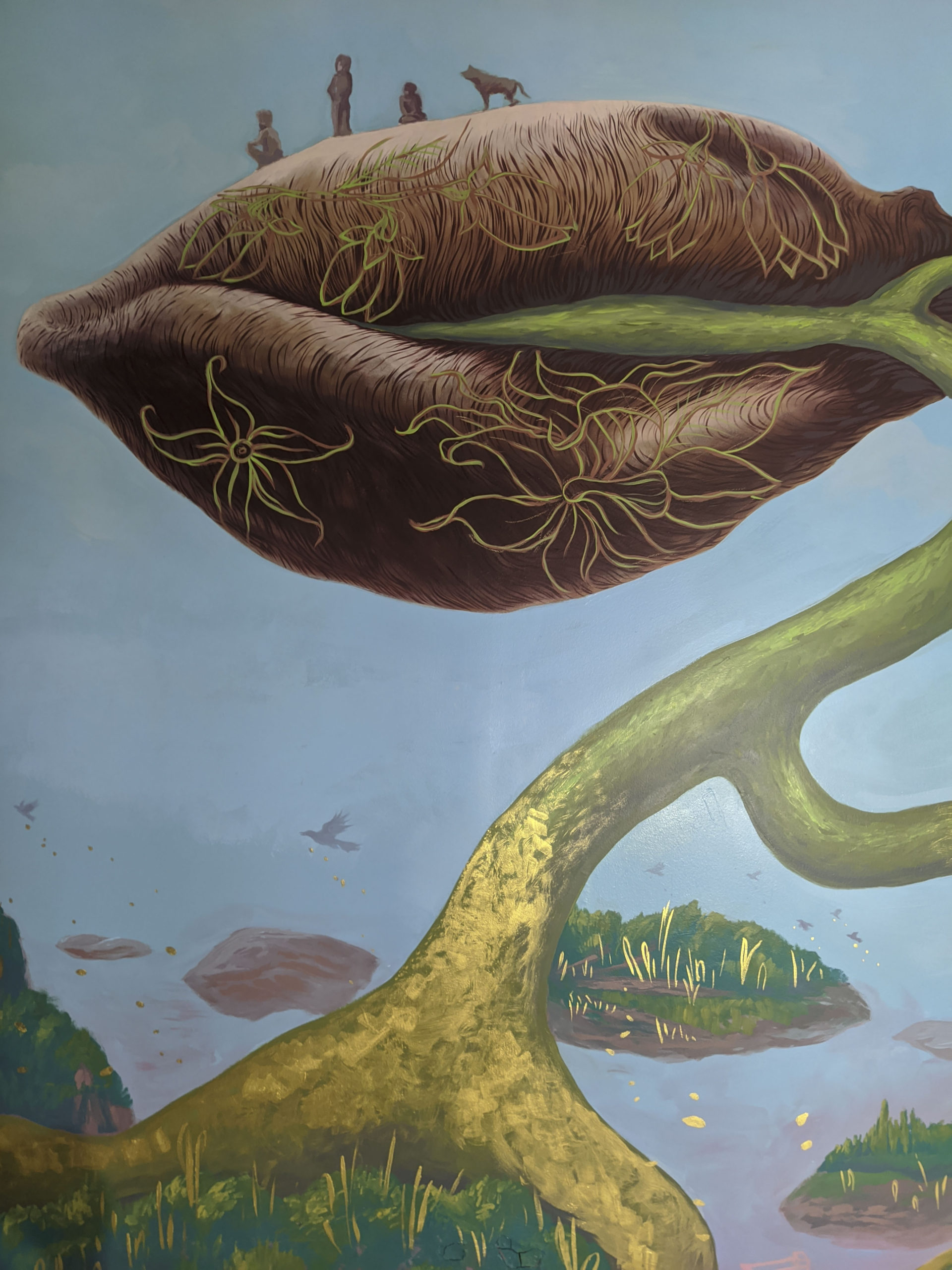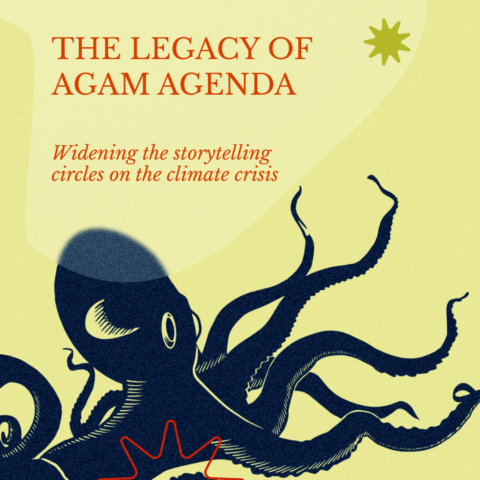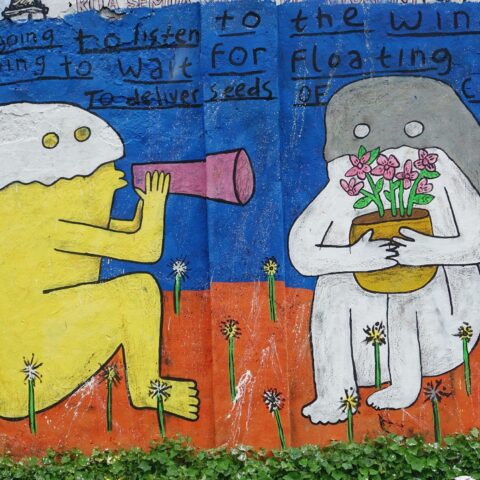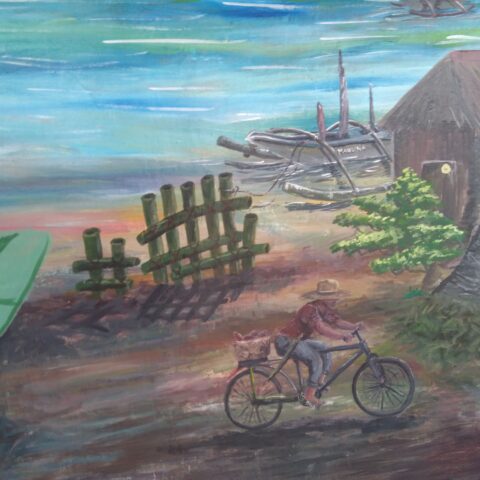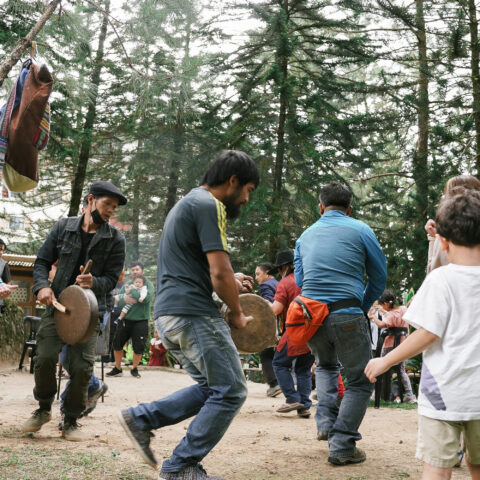A mural stands in Iloilo city, Philippines, painted by local artists and inspired by poems from around the world, in support of the When Is Now global creative campaign led by Agam Agenda. Photo: The Climate Reality Project Philippines.
In the face of the climate crisis we search for ways to mend a collapsing world.
But more often than not, the spaces where climate change is discussed are spaces where people’s lived experiences are stripped away. Scientific jargon and restricting formats keep knowledge-sharing limited in both its accessibility and scope. Yet the root of the climate crisis comes from how we relate to and live with the different ecosystems on Earth.
Opening up conversations to include our personal experiences of changing landscapes, and how this impacts our bodies and communities, can enrich how we move forward.
The connections between us, the insects, fungi, soil, water, plants, and animals—and nature’s processes—can reveal to us how we must maneuver to live without destruction. Placing our focus on connections allows us also to feel how we are collectively impacted by climate change, despite where in the world we may be.
Taking the time to feel, confront, and share the impacts of climate change, Agam Agenda gathered individuals from across the world to take part in the Poets for Climate workshops. This four-week workshop is a collaborative project between the branches of Climate Reality in the Philippines, Africa, and Canada, and part of the When Is Now campaign, led by Agam Agenda.
Writers gathered virtually every Thursday in August to share their experiences by writing ‘pebble poems’ on the changing landscapes of their homes. Focusing on how place has shaped who we are and gives us knowledge about the world, contributing poets wrote pieces anchored in different bioregions: forests; freshwater; islands and coasts; tundra and highlands; deserts and arid places; and grasslands. Several renowned writers, musicians, and environmental activists joined the workshop as mentors.
By examining the links between our actions and our planet home, we see that the connections are both intricate and diverse. Pollution and overconsumption in the north bring weather changes in the south; and the loss of one species can affect a full ecosystem, and its neighboring bioregions.
Clemence Roy Darisse, a social justice activist and actress from Canada, brought her expertise on ecological theater to guide participants on how to transform and integrate emotions, like anxiety and despair, into creations.
Charlene Winger Jones, a Water Walker from Saukiing Anishinaabekiing in Canada, emphasized the value of spending time in nature to learn and connect with our environments.
Malebo Sephodi, South African feminist scholar and award-winning writer, shares with participants how incorporating her interdicisplinary knowledge on development, gender, and communication has shaped her writing.
A pebble poem is a concept shared by Filipino poet Marjorie Evasco and builds the framework of this workshop series. These poems are very short pieces that encourage anyone to write about their sense of place and respond to the ecological crisis. Participants were asked to read poems by authors from other parts of the world as inspiration for their writing, but also as a way of seeing and listening to each other’s stories.
For many participants writing about place allowed them to process, grieve, and call for action for the forests, waters, and lands they call home. It also allowed them to collectively share their burdens and hopes with others.
It’s very therapeutic and reassuring that we are not alone.
Paula Bernasor, from the Philippines said that “It’s very therapeutic and reassuring that we are not alone.” Ava Arnejo, another participant from the Philippines, said that “writing can really help us all process these emotions”, and Alexi Hachey-Brunet mentioned “I feel the same way, it’s a big wave of hope.”
The process of creating pebble poems highlights our connectedness, not just with each other, but also the connections between us and our places.
The range of participants in the workshop gave a diversity of perspectives expressed in multiple languages, and allowed us to harness the arts to create a space of sharing. The poems generated from the Poets for Climate workshops will join the When Is Now virtual exhibit and be shared at the upcoming 27th United Nations Climate Change conference, taking place in Egypt in November 2022.
